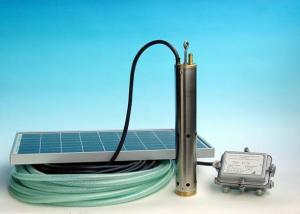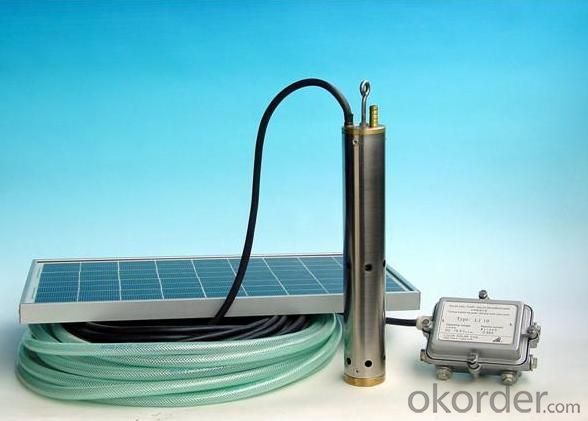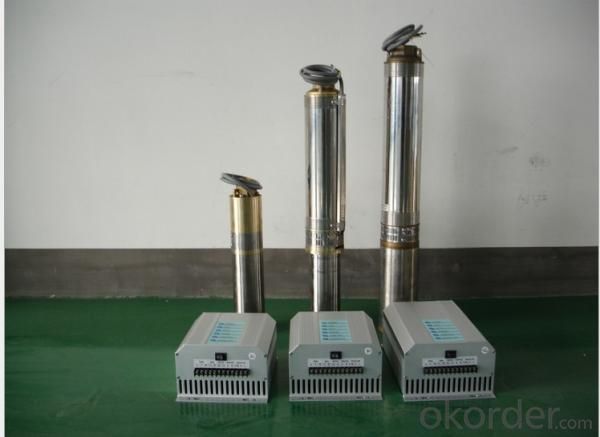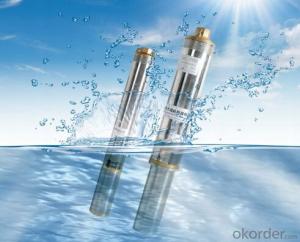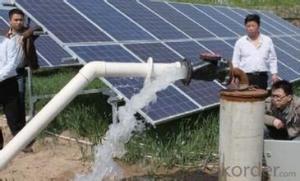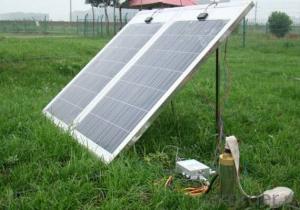Well Solar Pump SHP1.38/45-36/320
- Loading Port:
- China Main Port
- Payment Terms:
- TT or LC
- Min Order Qty:
- 10 Unites unit
- Supply Capability:
- 10000 Unites unit/month
OKorder Service Pledge
OKorder Financial Service
You Might Also Like
Specifications of Solar Pumps
Solar Pump is a pumping device powered by solar energy, which consists of solar pumping inverter and pump, and is mainly applied to agricultural irrigation, desert control, pasture animal husbandry, city waterscape, seawater desalination and fresh water supply, etc.
| Type | SHP1.38/45-36/320 | |||||
| Operation Voltage | 36V DC | |||||
| Power of Solar Cell | 320W | |||||
| Max.flow Rate | 1.38 M3/H | |||||
| Max.head | 45M | |||||
| Q=M3/H | 1.38-1.16-1.00-0.55 | |||||
| H=M | 1-20-30-45 | |||||
| Outlet Caliber | 20mm | |||||
| Pumps Diameter | 76mm | |||||
| Pumps Length | 370mm | |||||
| Weight | 5.90Kg | |||||
| Protection Level | IP68 | |||||
| Carton Size | 600×200×160mm | |||||
| 20GP Contain Number | 1100sets | |||||
Features of Solar Pumps
High efficiency& High reliability; Driven by PM. Brushless DC Motor; Minimum maintenance, long life& without watching; Powered by PV/Wind/Battery; All the necessary production; Environment friendly materials, lubricate without oil;
Applications of Solar Pumps
Village or family water supply; Animal drinking water and lives tock watering; Garden/Countryard Irrigation; Natatorinm/swimming pool
Water supply for bivouac or camping car; Water supply for remote areas
Automatic Control of Solar Pumps
Operate automatically & without watching; Protected from dry operation; Maximal Power Point Tracking (MPPT); Protected from dry operation;
New Technology of Solar Pumps
1. Application Innovation
The DC PM brushless motor has increased its efficiency up to 25% in comparison with traditional small asynchronous motor-25% PV Modules could be saved.
2. Technology Innovation(Patent)
Stator and rotor are sealed by environment friendly casting resin. The motor’s insulation resistance can be hold higher than 300MΩ, for more than 10 years. I t consumedly increased the security and reliability of the submersible motor.
3. Structure Novelty
Casting resin technology processed stator and rotao as well as the water lubricated bearing make the submersible pump environment friendly(no even one glob oil), easy to install and more reliability.
Packaging and Delivery of Solar Pumps
Solar Pumps are deliveried by sea. Carton Packaging. It should be noticed that the machine need to be place carefully and patiently.
Installation Pictures of Solar Pumps
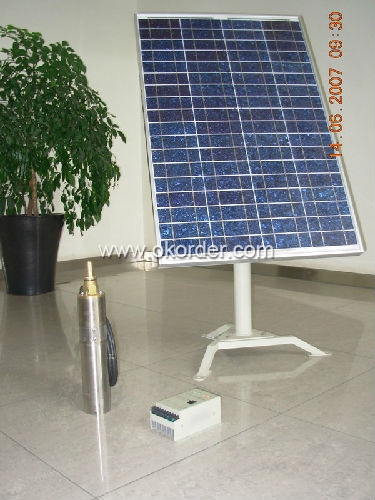

- Q: How does the efficiency of a solar pump system vary with different water viscosities?
- Different water viscosities can affect the efficiency of a solar pump system. Viscosity refers to how thick or resistant a liquid, like water, is to flow. Generally, higher water viscosities can cause the efficiency of a solar pump system to decrease. This is because higher viscosity leads to more friction and resistance within the pump system. As the water thickens, it requires more energy to move and overcome the resistance, which can reduce the overall efficiency of the system. In addition, higher viscosity can also impact the performance of the pump itself. The pump is usually designed and optimized for a specific range of water viscosities. If the viscosity strays significantly from the ideal range, the pump may not be able to operate efficiently, resulting in lower performance and overall efficiency. It's worth noting that the effect of water viscosity on solar pump system efficiency may differ depending on the system's specific design and components. Some systems may be more adaptable to viscosity changes, while others may be more sensitive. Therefore, it's advisable to consult the manufacturer or system specifications to determine the recommended viscosity range for optimal performance and efficiency.
- Q: How does a solar pump help in promoting sustainable development?
- A solar pump helps in promoting sustainable development by harnessing the power of the sun to provide a clean and renewable source of energy for pumping water. It reduces the reliance on fossil fuels and electricity, which in turn decreases greenhouse gas emissions and air pollution. Furthermore, solar pumps enable access to water in remote areas where grid electricity is unavailable, improving agricultural productivity, providing safe drinking water, and supporting overall economic development. This sustainable solution not only conserves resources but also contributes to the social, economic, and environmental aspects of sustainable development.
- Q: Can a solar pump be used in areas with limited access to local dealers or distributors?
- Yes, a solar pump can be effectively used in areas with limited access to local dealers or distributors. Since solar pumps operate on solar energy, they do not require a direct connection to the electricity grid or any fuel source, making them suitable for remote locations. Additionally, solar pumps are relatively low-maintenance and have long lifespans, reducing the need for frequent servicing or part replacements, which can be challenging in areas with limited access to dealers or distributors.
- Q: What is the impact of a solar pump on rural development?
- A solar pump has a significant impact on rural development. It provides a reliable and sustainable source of water for irrigation, livestock, and household needs, thereby improving agricultural productivity and food security in rural areas. It reduces the dependence on traditional manual methods of water extraction, which are labor-intensive and time-consuming. Moreover, solar pumps decrease the reliance on fossil fuels or grid electricity, reducing costs and promoting environmental sustainability. The availability of water through solar pumps also enables the development of small-scale industries, such as fish farming and vegetable cultivation, which further contribute to rural economic growth. Overall, solar pumps play a crucial role in enhancing livelihoods, increasing income opportunities, and improving overall living conditions in rural communities.
- Q: How does a solar pump handle water source contamination from chemical spills?
- A solar pump does not have the ability to handle water source contamination from chemical spills directly. However, it can help in situations where contaminated water needs to be removed or pumped away from the affected area, minimizing further spread of the contamination.
- Q: How does the size of the water storage tank affect the performance of a solar pump?
- The size of the water storage tank can affect the performance of a solar pump in several ways. Firstly, a larger tank allows for more water to be stored, thus increasing the available water supply for the pump. This can result in a steady and consistent water flow, especially during periods of low sunlight or variable weather conditions. Additionally, a larger tank can help compensate for any fluctuations in solar energy availability. When there is excess sunlight, the solar pump can fill up the tank, creating a reserve that can be used during periods of reduced sunlight. This ensures a more reliable water supply and prevents interruptions in pumping operations. Moreover, a larger tank can also reduce the frequency of starting and stopping the pump. This is because the pump can run for a longer duration, drawing water from the tank, before needing to turn off. Reducing the number of start-stop cycles can improve the overall efficiency and longevity of the pump. In summary, a larger water storage tank for a solar pump enhances water availability, compensates for variations in solar energy, and optimizes pump performance by reducing the frequency of start-stop cycles.
- Q: Can solar pumps be used for water supply in refugee settlements or camps?
- Yes, solar pumps can be effectively used for water supply in refugee settlements or camps. Solar pumps are an efficient and sustainable solution that can provide a reliable source of water without the need for electricity or fuel. They can be easily installed and require minimal maintenance, making them ideal for remote and resource-limited areas like refugee camps. Solar pumps can help ensure access to clean and safe water for drinking, sanitation, and other essential needs, thereby improving the living conditions and well-being of refugees in these settlements.
- Q: Can a solar pump be used in remote locations?
- Yes, a solar pump can be used in remote locations. It does not require access to electricity grids, as it operates using solar power generated by photovoltaic panels. This makes it an ideal solution for areas where there is limited or no access to electricity, allowing for the efficient pumping of water in remote locations.
- Q: What is the expected lifespan of the controller in a solar pump?
- The expected lifespan of a controller in a solar pump can vary depending on various factors such as the quality of the controller, the manufacturer's specifications, and the operating conditions. However, on average, a well-maintained and high-quality solar pump controller can last anywhere between 10 to 15 years.
- Q: What is the maximum head lift of a solar pump?
- The maximum head lift of a solar pump refers to the highest vertical distance that the pump can lift water from its source up to its destination. It depends on various factors such as the power output of the solar panels, the efficiency of the pump, and the local atmospheric conditions. Generally, solar pumps have a maximum head lift ranging from 30 to 200 meters, depending on the specific model and configuration.
1. Manufacturer Overview
| Location | |
| Year Established | |
| Annual Output Value | |
| Main Markets | |
| Company Certifications |
2. Manufacturer Certificates
| a) Certification Name | |
| Range | |
| Reference | |
| Validity Period |
3. Manufacturer Capability
| a) Trade Capacity | |
| Nearest Port | |
| Export Percentage | |
| No.of Employees in Trade Department | |
| Language Spoken: | |
| b) Factory Information | |
| Factory Size: | |
| No. of Production Lines | |
| Contract Manufacturing | |
| Product Price Range | |
Send your message to us
Well Solar Pump SHP1.38/45-36/320
- Loading Port:
- China Main Port
- Payment Terms:
- TT or LC
- Min Order Qty:
- 10 Unites unit
- Supply Capability:
- 10000 Unites unit/month
OKorder Service Pledge
OKorder Financial Service
Similar products
Hot products
Hot Searches
Related keywords
